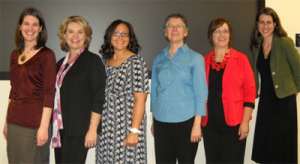
The rise in obesity rates in the United States has led to many interventions designed to combat obesity, but these programs are not always evaluated to determine whether or not they are working. Researchers for the Center of Excellence in Training and Research Translation (Center TRT) traveled to California in June to train public health practitioners in how to conduct practical evaluation.
Center TRT is based at the UNC Center for Health Promotion and Disease Prevention and funded through the CDC Prevention Research Center Program. Center TRT is focused on disseminating evidence for and training practitioners on policy, systems and environmental change interventions.
Center TRT team members Avia Mainor and Abby Lowe presented a Practical Evaluation workshop at the the 2013 California Childhood Obesity Conference. The two-part workshop introduced participants to evaluation terminology and tools and then built on that knowledge for more advanced evaluation training. Participants were introduced to logic models, graphical interpretations of a project’s steps and expected outcomes. The workshop focused on interventions for healthy eating, active lifestyles and breastfeeding.
The advanced training introduced the Center TRT Evaluation Framework and its application. The Center TRT Evaluation Framework is designed specifically for evaluation of policy and environmental change interventions, and this workshop also focused on healthy eating, active lifestyles and breastfeeding to customize the needs of the audience.
“Our trainings were focused on increasing capacity among public health practitioners to evaluate policy, systems, and environmental change interventions for obesity prevention,” Lowe said. “This is an area where practitioners are asking for help, so the workshops helped to fill a real need in our field.”
By improving the evaluations that public health practitioners’ interventions, Lowe said the entire field will have the benefit of more knowledge of what works and doesn’t work in obesity prevention.
Lowe said the training sessions were extremely well received. Participants’ feedback indicated that the training clearly explained practical evaluation and allowed for time to try the techniques during the training session.
